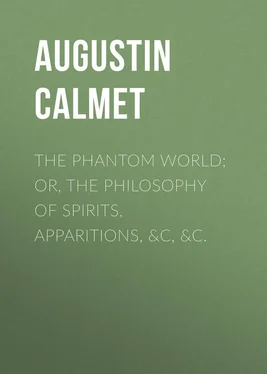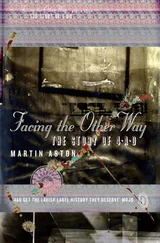Augustin Calmet - The Phantom World; or, The philosophy of spirits, apparitions, &c, &c.
Здесь есть возможность читать онлайн «Augustin Calmet - The Phantom World; or, The philosophy of spirits, apparitions, &c, &c.» — ознакомительный отрывок электронной книги совершенно бесплатно, а после прочтения отрывка купить полную версию. В некоторых случаях можно слушать аудио, скачать через торрент в формате fb2 и присутствует краткое содержание. Жанр: foreign_antique, foreign_prose, на английском языке. Описание произведения, (предисловие) а так же отзывы посетителей доступны на портале библиотеки ЛибКат.
- Название:The Phantom World; or, The philosophy of spirits, apparitions, &c, &c.
- Автор:
- Жанр:
- Год:неизвестен
- ISBN:нет данных
- Рейтинг книги:3 / 5. Голосов: 1
-
Избранное:Добавить в избранное
- Отзывы:
-
Ваша оценка:
- 60
- 1
- 2
- 3
- 4
- 5
The Phantom World; or, The philosophy of spirits, apparitions, &c, &c.: краткое содержание, описание и аннотация
Предлагаем к чтению аннотацию, описание, краткое содержание или предисловие (зависит от того, что написал сам автор книги «The Phantom World; or, The philosophy of spirits, apparitions, &c, &c.»). Если вы не нашли необходимую информацию о книге — напишите в комментариях, мы постараемся отыскать её.
The Phantom World; or, The philosophy of spirits, apparitions, &c, &c. — читать онлайн ознакомительный отрывок
Ниже представлен текст книги, разбитый по страницам. Система сохранения места последней прочитанной страницы, позволяет с удобством читать онлайн бесплатно книгу «The Phantom World; or, The philosophy of spirits, apparitions, &c, &c.», без необходимости каждый раз заново искать на чём Вы остановились. Поставьте закладку, и сможете в любой момент перейти на страницу, на которой закончили чтение.
Интервал:
Закладка:
Macrobius 204 204 Macrob. Saturnal. lib. i. c. 23.
relates that the Emperor Trajan, to prove the oracle of Heliopolis in Phœnicia, sent him a well-sealed letter in which nothing was written; the oracle commanded that a blank letter should also be sent to the emperor. The priests of the oracle were much surprised at this, not knowing the reason of it. Another time the same emperor sent to consult this same oracle to know whether he should return safe from his expedition against the Parthians. The oracle commanded that they should send him some branches of a knotted vine, which was sacred in his temple. Neither the emperor nor any one else could guess what that meant; but his body, or rather his bones, having been brought to Rome after his death, which happened during his journey, it was supposed that the oracle had intended to predict his death, and designate his fleshless bones, which somewhat resemble the branches of a vine.
It is easy to explain this quite otherwise. If he had returned victorious, the vine being the source of wine which rejoices the heart of man, and is agreeable to both gods and men, would have typified his victory – and if the expedition had proved fruitless, the wood of the vine, which is useless for any kind of work, and only good for burning as firewood, might in that case signify the inutility of this expedition. It is allowed that the artifice, malice, and inventions of the heathen priests had much to do with the oracles; but are we to infer from this that the demon had no part in the matter?
We must allow that as by degrees the light of the Gospel was spread in the world, the reign of the demon, ignorance, corruption of morals, and crime, diminished. The priests who pretended to predict, by the inspiration of the evil spirit, things concealed from mortal knowledge, or who misled the people by their illusions and impostures, were obliged to confess that the Christians imposed silence on them, either by the empire they exercised over the devil, or else by discovering the malice and knavishness of the priests, which the people had not dared to sound, from a blind respect which they had for this mystery of iniquity.
If in our days any one would deny that in former times there were oracles which were rendered by the inspiration of the demon, we might convince him of it by what is still practiced in Lapland, and by what missionaries 205 205 Lettres édifiantes, tom. x.
relate, that in India the demon reveals things hidden and to come, not by the mouth of idols, but by that of the priests, who are present when they interrogate either the statues or the demon. And they remark that there the demon becomes mute and powerless, in proportion as the light of the Gospel is spread among these nations. Thus then the silence of the oracles may be attributed – 1. To a superhuman cause, which is the power of Jesus Christ, and the publication of the Gospel. 2. Mankind are become less superstitious, and bolder in searching out the cause of these pretended revelations. 3. To their having become less credulous, as Cicero says. 206 206 Cicero, de Divinat. lib. ii. c. 57.
4. Because princes have imposed silence on the oracles, fearing that they might inspire the nation with rebellious principles. For which reason, Lucan says, that princes feared to discover the future. 207 207 "Reges timent futura Et superos vetant loqui." Lucan , Pharsal. lib. v. p. 112.
Strabo 208 208 Strabo, lib. xvii.
conjectures that the Romans neglected them because they had the Sibylline books, and their auspices (aruspices, or haruspices), which stood them instead of oracles. M. Vandale demonstrates that some remains of the oracles might yet be seen under the Christian emperors. It was then only in process of time that oracles were entirely abolished; and it may be boldly asserted that sometimes the evil spirit revealed the future, and inspired the ministers of false gods, by permission of the Almighty, who wished to punish the confidence of the infidels in their idols. It would be going too far, if we affirmed that all that was said of the oracles was only the effect of the artifices or the malice of the priests, who always imposed on the credulity of mankind. Read on this subject the learned reply of Father Balthus to the treatises of MM. Vandale and Fontenelle.
CHAPTER XVIII.
ON SORCERERS AND SORCERESSES, OR WITCHES
The empire of the devil nowhere shines forth with more lustre than in what is related of the Sabbath (witches' sabbath or assembly), where he receives the homage of those of both sexes who have abandoned themselves to him. It is there, the wizards and witches say, that he exercises the greatest authority, and appears in a visible form, but always hideous, misshapen, and terrible; always during the night in out-of-the-way places, and arrayed in a manner more gloomy than gay, rather sad and dull, than majestic and brilliant. If they pay their adoration in that place to the prince of darkness, he shows himself there in a despicable posture, and in a base, contemptible and hideous form; if people eat there, the viands of the feast are dirty, insipid, and destitute of solidity and substance – they neither satisfy the appetite, nor please the palate; if they dance there, it is without order, without skill, without propriety.
To endeavor to give a description of the infernal sabbath, is to aim at describing what has no existence and never has existed, except in the craving and deluded imagination of sorcerers and sorceresses: the paintings we have of it are conceived after the reveries of those who fancy they have been transported through the air to the sabbath, both in body and soul.
People are carried thither, say they, sitting on a broom-stick, sometimes on the clouds or on a he-goat. Neither the place, the time, nor the day when they assemble is fixed. It is sometimes in a lonely forest, sometimes in a desert, usually on the Wednesday or the Thursday night; the most solemn of all is that of the eve of St. John the Baptist: they there distribute to every sorcerer the ointment with which he must anoint himself when he desires to go to the sabbath, and the spell-powder he must make use of in his magic operations. They must all appear together in this general assembly, and he who is absent is severely ill-used both in word and deed. As to the private meetings, the demon is more indulgent to those who are absent for some particular reason.
As to the ointment with which they anoint themselves, some authors, amongst others, John Baptista Porta, and John Wierius, 209 209 Joan. Vier. lib. ii. c. 7.
boast that they know the composition. Amongst other ingredients there are many narcotic drugs, which cause those who make use of it to fall into a profound slumber, during which they imagine that they are carried to the sabbath up the chimney, at the top of which they find a tall black man, 210 210 A remarkably fine print on this subject was published at Paris some years ago; if we remember right, it was suppressed.
with horns, who transports them where they wish to go, and afterwards brings them back again by the same chimney. The accounts given by these people, and the description which they give of their assemblies, are wanting in unity and uniformity.
The demon, their chief, appears there, either in the shape of a he-goat, or as a great black dog, or as an immense raven; he is seated on an elevated throne, and receives there the homage of those present in a way which decency does not allow us to describe. In this nocturnal assembly they sing, they dance, they abandon themselves to the most shameful disorder; they sit down to table, and indulge in good cheer; while at the same time they see on the table neither knife nor fork, salt nor oil; they find the viands devoid of savor, and quit the table without their hunger being satisfied.
Читать дальшеИнтервал:
Закладка:
Похожие книги на «The Phantom World; or, The philosophy of spirits, apparitions, &c, &c.»
Представляем Вашему вниманию похожие книги на «The Phantom World; or, The philosophy of spirits, apparitions, &c, &c.» списком для выбора. Мы отобрали схожую по названию и смыслу литературу в надежде предоставить читателям больше вариантов отыскать новые, интересные, ещё непрочитанные произведения.
Обсуждение, отзывы о книге «The Phantom World; or, The philosophy of spirits, apparitions, &c, &c.» и просто собственные мнения читателей. Оставьте ваши комментарии, напишите, что Вы думаете о произведении, его смысле или главных героях. Укажите что конкретно понравилось, а что нет, и почему Вы так считаете.












